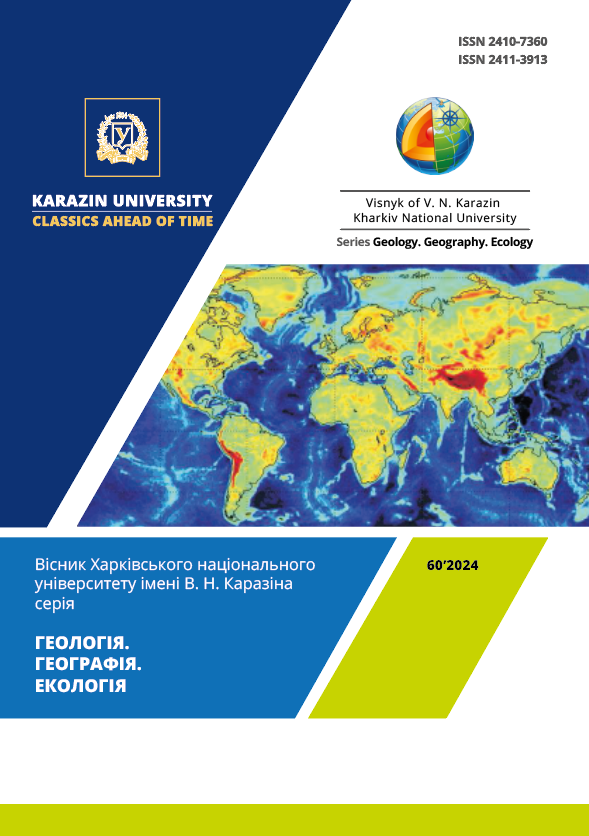Problems of optimizing the production and export of environmentally friendly consumer products in Azerbaijan
Abstract
State of the problem. In the article, it is justified that the provision of a green economy based on environmentalization, modernization, innovation and new technologies in the production and processing of agricultural products leads to a radical improvement of production, protection of natural capital and ecosystem services, and reduction of pollution and greenhouse gas emissions. It was noted that the regulation of agricultural production systems in the country requires the expansion of agricultural practices that increase productivity and production, contribute to the protection of ecosystems, adaptation to climate change, extreme weather events, droughts, and floods.
Research object. It is the production, processing, consumption and export of agricultural products of Azerbaijan.
The purpose of the study is to promote the production of ecologically clean and export-important consumer products in Azerbaijan and the stimulation of its export. Introducing the country to the world with branded products, attracting foreign investments to this field, increasing the population's interest in the agricultural field, and attracting innovative technology to the field are also considered important. It is the determination of the damage caused by the impact on the agricultural sector and nature due to the degradation of the growing environmental components. Minimizing losses at this stage and optimizing the development of the agro-industrial complex is one of the main factors.
Methodology. Generalization, historical, statistical, systematic analysis and comparison methods were used in the preparation of the article.
Scientific novelty of the research. Implementation of the production and processing of ecologically clean agro-industrial products that do not harm human health and the environment, regular monitoring of the ecological condition of the soil, and the provision of increasing the production and assortment of ecologically clean export-oriented food and light industrial products.
Research results. In the article, it is explained that the development of the green economy in Azerbaijan is an integral part of the state policy, and it occupies an important place in the state administration, on the example of export-oriented food and light industrial products. It is noted that the sustainability of the development of the green economy acts as a criterion for the production of competitive products of the state, which contributes positively to the provision of people's vital needs.
Downloads
References
Aagerup, U., Frank, A.-S., and Hultqvist, E. (2019). The persuasive effects of emotional green packaging claims. Br. Food J. 121, 3233–3246. https://doi.org/10.1108/BFJ-08-2019-0652
Aksoy, U., Boz, İ., Eynalov, H. & Guliyev, Y. (2018). Organic Agriculture in Azerbaijan: Current status and potentials for future development. Ankara, FAO. 104. Available at: http://www.fao.org/3/a-i831e.pdf
Anar Abbasov (2020). Production and sales markets of organic agricultural products. Agricultural Economy, 2 (32), 53-66. [in Azerbaijani]
Amanova S., Hajiyeva G. (2023). Investigation of Natural Condition in Urban Landscapes of Plain Areas Based on GIS, C. R. Acad. Bulg. Sci., 76(11), 1679–1689. https://doi.org/10.7546/CRABS.2023.11.05
Anderson, E. C., Wormwood, J., Barrett, L. F., and Quigley, K. S. (2019). Vegetarians’ and omnivores’ affective and physiological responses to images of food. Food Qual. Pref. 71, 96–105. https://doi.org/10.1016/j.foodqual.2018.06.008
Babayev A.H., Babayev V.A. (2011). Basics of ecological agriculture, Baku, "Law", 383.
Banovic, M., Reinders, M. J., Claret, A., Guerrero, L., and Krystallis, A. (2019). A cross-cultural perspective on impact of health and nutrition claims, country-of-origin and eco-label on consumer choice of new aquaculture products. Food Res. Int. 123, 36–47. https://doi.org/10.1016/j.foodres.2019.04.031
Barsics, F., Megido, R. C., Brostaux, Y., Barsics, C., Blecker, C., Haubruge, E., et al. (2017). Could new information influence attitudes to foods supplemented with edible insects? Br. Food J. 119, 2027–2039. https://doi.org/10.1108/BFJ-11-2016-0541
Berger, V. (2019). Social norm-based gamification to promote eco-friendly food choice. J Consum. Mark. 36, 666–676. https://doi.org/10.1017/S1368980017002889
Cadario, R., and Chandon, P. (2019). Which healthy eating nudges work best? A meta-analysis of field experiments. Mark. Sci. 39, 459–665.
Cairns, G. (2019). A critical review of evidence on the sociocultural impacts of food marketing and policy implications. Appetite 136, 193–207. https://doi.org/10.1016/j.appet.2019.02.002
Carfora, V., Catellani, P., Caso, D., and Conner, M. (2019). How to reduce red and processed meat consumption by daily text messages targeting environment or health benefits. J. Environ. Psychol. 65:101319. https://doi.org/10.1016/j.jenvp.2019.101319
Circus, V. E., and Robison, R. (2019). Exploring perceptions of sustainable proteins and meat attachment. Br. Food J. 121, 533–545. https://doi.org/10.1108/Bfj-01-2018-0025
Cooremans, K., and Geuens, M. (2019). Same but different: using anthropomorphism in the battle against food waste. J. Public Policy Mark. 38, 232–245. https://doi.org/10.1177/0743915619827941
Fataliyev Hasil (2009). Production of safe food products is the demand of the times. Respublika, 6. [in Azerbaijani].
Ferrari, L., Cavaliere, A., De Marchi, E., and Banterle, A. (2019). Can nudging improve the environmental impact of food supply chain? A systematic review. Trends Food Sci. Technol. 91, 184–192 https://doi.org/10.1016/j.tifs.2019.07.004
Hajiyeva, A., Hajiyeva, G., Dadashova, K. K. (2023). Landscape-ecological carcass model of urban landscape and methods of optimize urban landscapes (on the patterns of Ganja and Mingachevir cities). Visnyk of V. N. Karazin Kharkiv National University, Series "Geology. Geography. Ecology", (59), 277-283. https://doi.org/10.26565/2410-7360-2023-59-20
Materials of the State Statistics Committee of the Republic of Azerbaijan, Baku, 2016 [in Azerbaijani]
Materials of the State Statistics Committee of the Republic of Azerbaijan, Baku, 2021 [in Azerbaijani]
Materials of the State Statistics Committee of the Republic of Azerbaijan, Baku, 2022 [in Azerbaijani]
Materials of the State Statistics Committee of the Republic of Azerbaijan, Baku, 2023 [in Azerbaijani]
Report on the status of organic farming and food economy in Azerbaijan, 2022 [in Azerbaijani]
Tea growing is a traditional field in the southern zone, especially Lankaran. Available at: https://modern.az/news/142327/ [in Azerbaijani]
Azərsun Holdinq. Sun tea factory. Available at: https://azersun.com/en/activity-fields/
Available at: https://gilanholding.com/industries/Gabala+Canning+Factory+100?hl=en
Available at: https://www.vpoxod.ru/page/nature/granat_info
Citations
Against the background of global climate changes, the current ecological situation of Azerbaijan's water resources and the directions of efficient use
Khalilov Ilgar & Eminov Farhad (2024) Visnyk of V.N. Karazin Kharkiv National University, series Geology. Geography. Ecology
Crossref

This work is licensed under a Creative Commons Attribution 4.0 International License.





